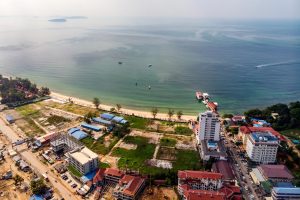Cambodia’s continued attempts to minimize the extent of cyber-slavery on its territory reflect official complicity, as well as the need to embark on a learning curve that many other countries have yet to master, experts say.
A huge volume of media reports concur that trafficking victims are recruited to work in cyber-slavery from China, and an ever-growing pool of other countries globally, with the promise of well-paid, legitimate employment in Southeast Asia. The victims are often young, with English speakers being the most valuable.
The victims often don’t know where they are really going. Some have reported that they thought they were going to work in Thailand. When they arrive, they find themselves transferred to closed compounds in countries, including Cambodia, Myanmar, and Laos. Their real task is to trick people who are trying to start a new relationship online into parting with their money.
The scammers work from scripts prepared to trick both male and female targets which have been smoothed to perfection by years of constant use. The trafficked victims are forced to keep working at their screens for as long as it takes to hit profit targets. Failure to bring in enough money, or any attempt to escape, leads to punishments including beatings and electrocution.
Cyber slavery in Southeast Asia may constitute “one of the largest coordinated trafficking in persons operations in history,” according to a 2023 report from the United Nations Office on Drugs and Crime (UNODC). The amounts that have been stolen by the scammers are astounding. Academics at the University of Texas have published research showing that crypto-currency transfers from scam operations into exchange deposit accounts total $75 billion since January 2020. Interpol secretary-general Jurgen Stock in March said that cyber slavery in the region contributes to the $2 trillion to $3 trillion of illicit global annual financial flows.
But Chou Bun Eng, permanent vice chairwoman of Cambodia’s National Committee for Counter Trafficking (NCCT), told the government-aligned Khmer Times in March that about 80 percent of reported cases of human trafficking are false.
Michael Brosowski, founder of the Blue Dragon NGO which works to rescue Vietnamese trafficking victims, says his organization is “surprised” to see the NCCT comments. The claim is “in stark contrast to the reality that we and everybody else is seeing: that tens of thousands of people from around Southeast Asia have been lured with fake promises of jobs and have instead been forced to work against their will in scam centers and casinos.”
“The gangsters running these places are reputed to be paying millions of dollars a year in bribes, so it’s essential that there be thorough, independent investigations of the claims of the victims,” Brosowski says.
Blue Dragon to date has rescued 1,486 people from trafficking. Brosowski says that pressure on Cambodian authorities from neighboring countries has resulted in some action to raid the compounds and make arrests. There has been a recent spate of raids on compounds in Sihanoukville, a major center of scam compounds. But there has yet to be a prosecution for running a scam compound in Cambodia. The country “must step up to do much, much more. Going slowly on this issue as they have done gives the traffickers opportunity to relocate,” for example to Myanmar, Brosowski says.
A combination of factors lies behind Cambodian denials, says Mina Chiang, founder of the U.K.-based Humanity Research Consultancy which seeks to end modern slavery. The denials, she says, are “perfectly normal,” given that some compounds are supported by government officials, military generals, and some police officials. “Nobody wants to admit that. It’s the reality.”
The desire to cover up the problem, she says, is complicated by a genuine belief among some in Cambodian law enforcement that the existence of signed work contracts excludes the possibility of slavery. The problem is not unique to Cambodia. Outside Cambodia, a lot of countries still don’t understand the reality of trafficking for cyber-crimes, and tend to equate it with abduction. Many developing countries, Chiang says, haven’t fully grasped that slavery can result from an apparently legal work contract.
Developed countries also need to address the issue. Nobody gets on a plane to Southeast Asia on the strength of an online job advert. Local traffickers in the countries of origin of the victims, Chiang stresses, are always needed. The U.K. is among countries which have had difficulty in facing up to trafficking taking place on their territory, she adds.
The U.K. has hardly covered itself in glory in tackling modern slavery as a whole. The government left the post of anti-slavery commissioner to lie vacant for 18 months before appointing Eleanor Lyons in October 2023. Lyons, critics argue, has experience as a political adviser to former prime minister Boris Johnson, and has worked in public relations, but has no previous experience of modern slavery.
“Crime happens everywhere,” Chiang says. “There’s nothing wrong with admitting it. The whole world is still gradually learning.”
Foreign governments for now are on their own in trying to protect their nationals from Cambodia’s scam compounds. An unnamed NGO told UNODC that in Cambodia, “the police will go to the compound, ask permission. They feel like they don’t have any jurisdiction there. They ask for permission to be there, and give the list of victims’ names. The guards will look only for those names. And the police wait outside.”
Brosowski at Blue Dragon is hopeful that this crisis in trafficking may soon reach a peak. If that happens, he says, it will be “not because of the actions of Cambodian law enforcement, but because people across the region have become extremely wary of work opportunities in Cambodia.”

































